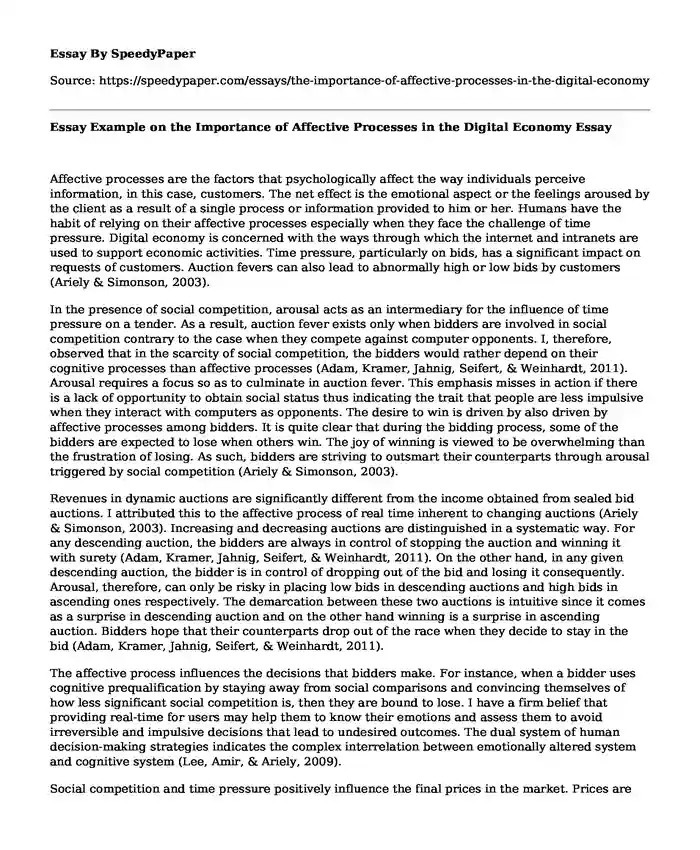
| Type of paper: | Essay |
| Categories: | Information technologies Social psychology |
| Pages: | 4 |
| Wordcount: | 830 words |
Affective processes are the factors that psychologically affect the way individuals perceive information, in this case, customers. The net effect is the emotional aspect or the feelings aroused by the client as a result of a single process or information provided to him or her. Humans have the habit of relying on their affective processes especially when they face the challenge of time pressure. Digital economy is concerned with the ways through which the internet and intranets are used to support economic activities. Time pressure, particularly on bids, has a significant impact on requests of customers. Auction fevers can also lead to abnormally high or low bids by customers (Ariely & Simonson, 2003).
In the presence of social competition, arousal acts as an intermediary for the influence of time pressure on a tender. As a result, auction fever exists only when bidders are involved in social competition contrary to the case when they compete against computer opponents. I, therefore, observed that in the scarcity of social competition, the bidders would rather depend on their cognitive processes than affective processes (Adam, Kramer, Jahnig, Seifert, & Weinhardt, 2011). Arousal requires a focus so as to culminate in auction fever. This emphasis misses in action if there is a lack of opportunity to obtain social status thus indicating the trait that people are less impulsive when they interact with computers as opponents. The desire to win is driven by also driven by affective processes among bidders. It is quite clear that during the bidding process, some of the bidders are expected to lose when others win. The joy of winning is viewed to be overwhelming than the frustration of losing. As such, bidders are striving to outsmart their counterparts through arousal triggered by social competition (Ariely & Simonson, 2003).
Revenues in dynamic auctions are significantly different from the income obtained from sealed bid auctions. I attributed this to the affective process of real time inherent to changing auctions (Ariely & Simonson, 2003). Increasing and decreasing auctions are distinguished in a systematic way. For any descending auction, the bidders are always in control of stopping the auction and winning it with surety (Adam, Kramer, Jahnig, Seifert, & Weinhardt, 2011). On the other hand, in any given descending auction, the bidder is in control of dropping out of the bid and losing it consequently. Arousal, therefore, can only be risky in placing low bids in descending auctions and high bids in ascending ones respectively. The demarcation between these two auctions is intuitive since it comes as a surprise in descending auction and on the other hand winning is a surprise in ascending auction. Bidders hope that their counterparts drop out of the race when they decide to stay in the bid (Adam, Kramer, Jahnig, Seifert, & Weinhardt, 2011).
The affective process influences the decisions that bidders make. For instance, when a bidder uses cognitive prequalification by staying away from social comparisons and convincing themselves of how less significant social competition is, then they are bound to lose. I have a firm belief that providing real-time for users may help them to know their emotions and assess them to avoid irreversible and impulsive decisions that lead to undesired outcomes. The dual system of human decision-making strategies indicates the complex interrelation between emotionally altered system and cognitive system (Lee, Amir, & Ariely, 2009).
Social competition and time pressure positively influence the final prices in the market. Prices are observed to be high during medium time pressure than during zero time pressure. Also, the distinction of final prices in small social competition and increased social competition is evident. During competition of bidders, the social competition levels, and time pressure tend to affect significantly the final prices that dominate the market.
The arousal that occurs towards the end of the bid is critical in any e-commerce bidding process. The importance is viewed from the perception that it is at this point that the bidders wholesomely decide the price at which they leave the auction. At this stage, the bidders are aware that the choices that they make are not only irreversible but also determine to win, losing and possible payments. I, therefore, expect the arousal of every bidder to be at its highest at the final phase of the auction (Adam, Kramer, Jahnig, Seifert, & Weinhardt, 2011).
References
Adam, M., Kramer, J., Jahnig, C., Seifert, S., & Weinhardt, C. (2011). Understanding auction fever: a framework for emotional bidding. Electronic Markets, 21(3), 197-207. http://dx.doi.org/10.1007/s12525-011-0068-9
Ariely, D. & Simonson, I. (2003). Buying, Bidding, Playing, or Competing? Value Assessment and Decision Dynamics in Online Auctions. Journal Of Consumer Psychology, 13(1), 113-123. http://dx.doi.org/10.1207/153276603768344834
Lee, L., Amir, O., & Ariely, D. (2009). In Search of Homo Economicus: Cognitive Noise and the Role of Emotion in Preference Consistency. J Consum Res, 36(2), 173-187. http://dx.doi.org/10.1086/597160
van den Bos, W., Talwar, A., & McClure, S. (2013). Neural Correlates of Reinforcement Learning and Social Preferences in Competitive Bidding. Journal Of Neuroscience, 33(5), 2137-2146. http://dx.doi.org/10.1523/jneurosci.3095-12.2013
Cite this page
Essay Example on the Importance of Affective Processes in the Digital Economy. (2019, Oct 07). Retrieved from https://speedypaper.com/essays/the-importance-of-affective-processes-in-the-digital-economy
Request Removal
If you are the original author of this essay and no longer wish to have it published on the SpeedyPaper website, please click below to request its removal:
- Free Essay on Food Culture
- Spyros Papapetros - Free Essay on Architecture
- Free Essay: The Lessons We Take from Failure Can Be Vital to Later Success
- Essay Sample on the Summary of the Article SLEEP
- Essay Example Dedicated to the Disability Rights Movements
- Solution-focused Therapy Essay Example
- Essay Example on the Stance of Music in the African American Culture
Popular categories




